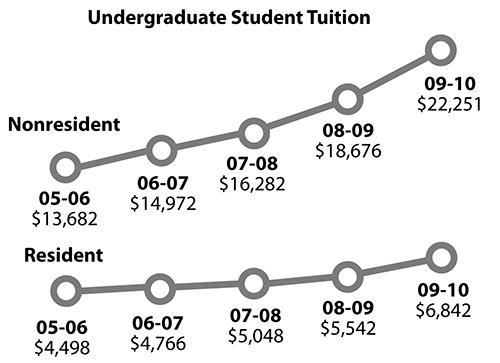The Arizona Board of Regents is considering permanently raising the number of non-resident students Arizona universities are allowed to enroll.
Two years ago, the regents voted to temporarily increase the non-resident student population cap to 40 percent of the total student population in Arizona. Next month, they will decide whether to make that change permanent.
About 30 percent of UA students are currently from out of state.
To UA administrators, the move grants the university additional flexibility in their admissions process.
“”I favor having some flexibility to allow this number to vary from year-to-year,”” UA President Robert Shelton wrote in an email. “”The admissions process is not completely scientific, (it) depends on applications and acceptance rates, so flexibility is important.””
Melissa Vito, the vice president of Student Affairs, said this flexibility ensures the UA can admit more qualified students from out-of-state. She also said the higher tuition costs non-resident students pay could help keep tuition rates at a more constant level.
“”Non-resident students typically pay the full cost of their education, and additional non-residents has the potential to allow us to retain more modest tuition for resident students,”” Vito said. “”The net tuition revenue from non-resident students is particularly important as state support declines.””
Last year, Arizona residents paid $6,842 in tuition and fees to attend the UA, approximately 30 percent of the rate paid by their non-resident cohort.
John Nametz, director of the Office of Student Financial Aid, estimated that 17 percent of every tuition dollar paid is made available to UA students in the form of institutional grants or scholarships.
“”If the university is allowed to enroll the students that we want to, it benefits the students,”” Nametz said. “”We’re a non-profit charity institution that works on the behalf of students and from what I see here, this change could be beneficial to students.””
Nametz also said he thinks it is “”pretty unlikely”” the UA will reach that 40 percent benchmark, and he doesn’t think resident students will be negatively affected by a rise in the non-resident student population.
“”From what I can see, enrollment at the university for students that are residents of Arizona has not been impacted at all in terms of admissibility,”” he said. “”Nobody’s been denied admissions because there are no spaces left.””
Elma Delic, board chair of the Arizona Students’ Association, also said she was unconcerned about the potential policy change because she doesn’t “”think the universities will reach that 40 percent cap any time soon.””
“”I think I would be concerned if there’s a huge push to enroll more out-of-state students,”” Delic said. “”If something like that were to happen, then we would take a more official stance on the issue.””
Approximately 31,659 UA students received some form of financial aid in the fiscal year 2009, with 21,506, more than half, receiving institutional aid. This includes 705 students who received the Regents High Honors Endorsement (Arizona’s Instrument to Measure Standards) tuition waiver.
In fall 2008, 2,632 non-resident students were awarded aid, with Pell Grant-eligible students receiving an average aid package of $14,777, and non Pell Grant-eligible students earning, on average, $7,519, according to a report from the board of regents.
Nametz said financial aid at the UA was a “”$20 million payroll”” for students, and the UA tries to offer as much financial aid not in the form of loans or work study as possible. Nametz also said his office does not consider residency as a criteria for most institutional financial aid.
“”In my office, we select the smartest, the best students that we know can help other students (for financial aid),”” Nametz said. “”We don’t even look at if they’re an Arizona resident or a non-resident for our aid, and as far as loans go (residency) is irrelevant.””
The Arizona Board of Regents will officially vote on the issue during their meeting from Feb. 17 to 18 on Arizona State University’s Tempe campus.









